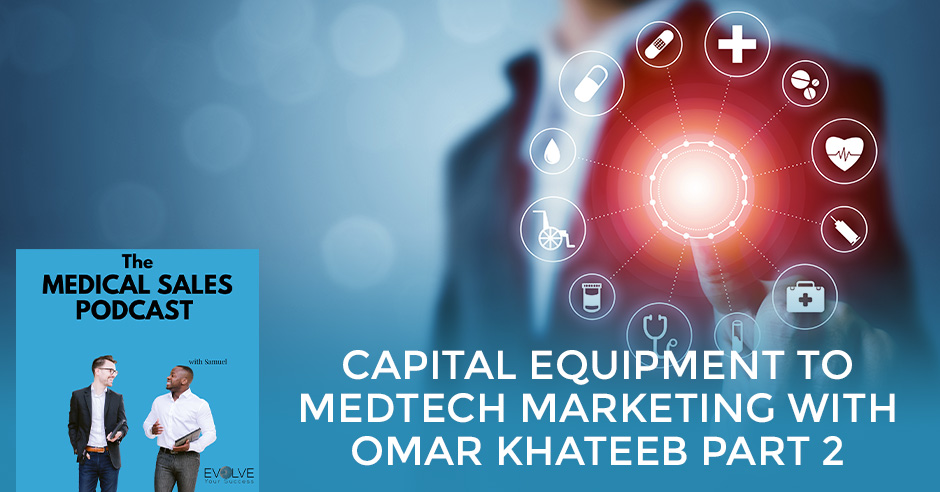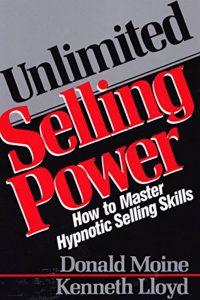
Social media’s vast reach and strong influence make it a powerful marketing tool today. Omar Khateeb continues his discussion with Samuel Adeyinka about capital equipment sales. This time, they discuss digital strategies that could help accelerate your marketing approaches. Omar explains how sales reps can build a solid following on LinkedIn and get in front of those who own the budget itself. He also talks about the impact of social media on shaping people into highly sophisticated buyers, raising the stakes in how MedTech marketing should approach its content creation tactics.
—
Watch the episode here
Listen to the podcast here
Capital Equipment To Medtech Marketing With Omar Khateeb Part 2
In this episode, we bring you part two with Omar Khateeb. This episode is deep and I say deep because Omar breaks it down for us. He talks about capital equipment sales, but not just that. He talks about why capital equipment sales reps and any sales reps in the medical sales space should be getting on LinkedIn to sell to their customers. He breaks down specifically what that looks like, what it does, and why it’s so critical.
Even identifying the type of buyer we have now, something that I’ve talked about and how that buyer needs to get information a certain way and how sales reps can show up that way on the LinkedIn platform, and how providers are flooding the platform more and even make some bold predictions that you’re going to learn in this episode.
This episode’s exciting. I love the level of the breakdown he does. By the time this episode’s over, you are going to think to yourself, “Why in the world am I not doing more on LinkedIn?” If you’re a sales rep in the field, you’re going to think to yourself, “Why haven’t I started to do these things on LinkedIn, or do I need to find a program that can help me do it?” That’s the episode that we have here, but I’ve already done too much. I’ve already said too much. Let me stop now and allow you to truly enjoy this episode. As always, thank you for tuning in. I hope you enjoy this interview.
—
It’s like picking a racehorse because sometimes you can find somebody who’s passionate about technology who is like, “I love everything,” and then you realize that this person has no influence. This person has a bad reputation. A lot of capital great capital sales is like CIA intelligence work where you’re digging in. You’re trying to understand things like who’s got the pull, who’s got the influence in the hospital, and so on and so forth.
Let’s say you find that clinical champion. The other part that makes this hard in most capital equipment, robotics is like this other capital equipment. Most of the time, you do not do an evaluation. For a lot of medical technology, the hospital says, “We’re going to do an evaluation so you’re going to send us some loaner systems and we’re going try for a week. In robotics, they don’t do that. You usually do a surgical lab.
Once you pick your clinical champion, you invite them to a surgical lab so that way they can try the system. They get their hands on it. They can clinically validate it. At that same time, you want to try and invite other surgeons who might be involved. It’s good to have one person though because even in business, nothing great was created by committees. It’s usually one person. You want one clinical champion.
Now, the reason why social media can accelerate this process is this. In the old way, a capital sales rep goes to the hospital or to the office. They try and send emails and they’re trying to do an in-person demo. They are trying to invite somebody to a surgical lab. The way social media can help is that these doctors and CEOs of hospitals, even you and I, are consumers. We don’t go on the weekend and buy stuff from Amazon or Instagram, etc. and then we put on our work clothes and go to work.
We become different people. It’s the same person. I mentioned this because the buyer now has become a lot more sophisticated right for everything. For example, even 5 or 6 years ago for let’s say a consumer product, you might see an ad. Let’s say you want to buy new athletic gear. We were talking about athletic gear. Maybe you see an ad on Facebook and it’s a cool video. It’s like, “I’m going to buy that,” or you type into Google, “Best athletic gear.” Whoever paid the most money for the SEO comes at the top and you purchase that.
People don’t do that anymore. People don’t fall for those things. Now, every company has to have reviews. You have to have all these things because every person needs some combination of things to say, “I’m buying this.” A great example is for me to buy a new car right now, this is the combination. If a company wants to sell me a car, this is it.
I will search for top SUVs on Google and I’m going to look at the random organic content that came out. If a certain SUV is in the top 3 in at least 3 or 4 different blogs, I then go test drive that. That’s my combination. Some people might be biased towards authority and say, “What does Joe Rogan drive? Whatever Joe Rogan drives, I’m going to drive that. Cameron Hanes drives the Ford Raptor. I’m buying that.”
Everybody needs this different combination. It’s the same with physicians and surgeons. Some surgeons want the new thing. They want to know what the new things are. They don’t want to see that other people are using it. This is my opinion. The high-tech marketers’ bible is Crossing the Chasm by Geoff Moore. This might just beat up to hell. You have to understand this. That’s why I keep saying technology adoption cycle. Some are later on in the adoption cycle where they say, “I don’t care about the company. I don’t care about all this. What’s the defacto standard? What’s everybody else using that’s not going away?“
Understanding that is important. No marketing budget, no amount of time’s going to help you find that person. Using something like LinkedIn, where you’re posting updates on your product, updates from people like, “We place systems in this hospital. I spent a day with this surgeon. This is their experience and it’s continuous.” This stuff is not easy. I’m going to admit it. It is exhausting every week to be like, “I got to do a post.” If you want to sell multimillion-dollar deals, my friend, this is what it takes.
The old way required a one-on-one transaction or engagement. I send an email. I get an email back. I go do a demo, I get feedback back. What’s quadratic and algorithmic that can scale is if you use social media to tell this story of the adoption of the product because at night, while you sleep, that’s having an impression on somebody.
[bctt tweet=”If you leave content on social media, it will have an impression on somebody even while you sleep at night.” via=”no”]
Let’s use the surgeon who’s a later adopter and this happened to me at Potrero. I used to post updates. Again, at Potrero, we had a critical care monitor which is $15,000. The standard at the time costs $80. We’re trying to convince a hospital to go from $80 to $15,000. That’s a big jump. I would constantly post every week. Even if it’s a screenshot, I would post a paper. “Here’s how urine output’s important.” I would post photos of me visiting a hospital or at a conference.
A lot of times, it wasn’t about the product. It was only telling the story, showing the journey because 6 to 9 months later, one of those people who is not a pioneer. He was later on in the adoption cycle or maybe an early adopter. He was this gentleman who was a cardiac anesthesiologist at the Cleveland Clinic. I did a post about a conference we were at and he commented saying, “I didn’t know you were there. Next time, we’ll try and connect.”
He was never on my radar. Cleveland Clinic, Florida was not on my radar. I sent him a message. I said, “Sorry, I missed you. What’s your cell? Let me give you a call. I’d like to hear about your practice and also tell you a little bit about the company I’m at. I’m curious what you think.” He gives me a cell. I call him and he’s like, “I’ve been following you guys for a few months now. That’s how I know about you.”
He’d been observing on his own time and then it got to a point where he saw enough adoption and things that he took an action consciously versus if you took all that social media away. When I get to that person, I’m starting from ground zero all over again. When you start a ground zero, guess what happens? You’re forcing your way in. You’re trying to get a meeting. You do all these cringy sales tactics and everything.
When somebody wants to talk to a salesperson, they know how to find them. You’re a business owner like me. When you want to talk to a salesperson from a software company you’re looking at, you’ll do it when you’re ready but up until that point, you don’t want to talk to any salesperson. You want to see everything online.

You said it beautifully. In one of these talks I gave, I refer to Gartner Research and how the buyer nowadays does not want to deal with the sales rep. They want to do their own due diligence on a platform and figure out everything for themselves. What they’re also seeing is that after they make a decision, a lot of them are remorseful.
They do not necessarily wish they had a sales rep, but they wished they had better information to have made a better decision. You’re coming in right at that point where you’re preventing them from making a bad decision and you’re going right into their process of wanting their own due diligence. They’re happy to talk to you because of this social media brand that you’ve established as a sales rep. That’s a beautiful model.
I don’t know if you put it this way, but I’m certain because I’ve seen some of the graduates from your program. Being a salesperson is a commodity. My great mentor, Chris Sells, convinced me to go into the market, “I wanted to be a sales exec.” He’s like, “Go into marketing and learn how the business works. There are thousands of salespeople.” Being a salesperson’s a commodity.
Let’s use surgeons because they’re the most sought after because of the amount of money involved. It’s not only you that’s going after them. It’s another med device people. That’s the obvious one, but then you got pharma and then you have biotech. How many is that? Maybe there are 8 or 10 different reps, but then let’s add some other things. There are people who are trying to get them for accounting, legal, and marketing services.
Nobody’s done the study, but I’ve anecdotally done it. I need to do it on a larger scale. From my own data, because I was in the private practice world in 2021 in SaaS, a private practice on average sees close to between 12 and 15 salespeople a day, whether showing up in person or calling. Can you imagine how insane that is? You’re being bucketed with everybody else. If you use social media the right way, which these surgeons, they’re logging on, if not once a week, they’re logging on every day. My data are showing that they’re on there constantly, especially with LinkedIn. You’re then able to position yourself as an authority figure.
Now, when you reach out to, let’s say, do a demo and do a meeting, the reason for the meeting is to learn about the technology but the reason why they’re meeting with you is you. Technology’s just an excuse. I noticed this coincidentally and I’m going to be bringing it back because I need to get back to my roots. I had a book show on LinkedIn. Every week, I did a book review.
iPhone video and that’s it but a lot of surgeons started watching it and even now and it happened in our livestream with medical sales-related topics like how to sell to doctors using social media. All these things have nothing to do with doctors, physicians are showing up and watching that stuff and commenting. The reason why is that physicians compared to a lot of other professionals have a culture of learning and education. For example, in sales, leadership is a big thing. There’s no leadership training in medical school residency. There’s none of that.

As a salesperson, you have the advantage to teach, “Here’s how I helped a younger salesperson on my team.” A surgeon can read that and say, “That’s a great idea. That’s what I can do with my residents.” Now when you’re teaching people and you don’t know who’s reading that stuff, they’re getting influenced by you. You’re an authority now already because you’re never going to be. I don’t care.
I went to medical school. I’ll never be completely an authority figure eye to eye in medicine with a surgeon. The funny way and the way that psychology and the brain work is that if you’re an authority in something, the brain already assumes that you’re at that level in other things. That’s a big power. You’ve had your company for many years now. What things are you guys experiencing with your own graduates?
We have two different types of clients. We have our graduates from the Medical Sales Career Builder, which get positions, and then we have the MedTech companies that are utilizing social media similar to yours. Our graduates are brand new in the field. They’re trying to get their feet wet. We’ve had our programs since 2019. Even our most advanced graduates are barely getting into that social media push to establish a brand. With our LinkedIn program, we’ve seen some amazing things with our graduates.
Even things as far as getting more access to customers and transitioning into different business units within the company they work for. One thing that people don’t realize is that when you do establish a brand and you are doing what we’re talking about, getting better access to your providers, the company workforce is also noticing that. They’re also noticing that you’ve increased your level of influence, which inevitably wants to have them put you in a position of more responsibility. That’s something we see with our graduates.
We have a medical sales team. Let’s say we have ten people in the class. Four of them are killing it. They’re doing everything. They’re taking all the strategies we teach on LinkedIn. They’re getting access. They’re even closing deals. Three of them are getting better. They’re warming up to it. They’re getting more comfortable with the content and the last three can’t find a single physician in their territory.
They’re wondering, “What’s the uptake here on more physicians and more surgeons getting on this platform?” I want to ask you, Omar, what have you seen regarding that? Surgeons are getting on this platform more and more. We see the same thing, but how long do you think it’s going to take until it’s truly a saturated thing where it’s a common practice that surgeons are a part of LinkedIn?
I think you want me to make a prediction. I don’t mind making a little bit of prediction but I’ll expand a bit on it. At a point where you have more than 90% of physicians on the platform, it’s going to happen probably in the next few years. There are two things. One is that we’ve crossed the path or a point where more than 48% of practices are owned by the hospital. A large majority of physicians, even those who own their prior practice, are employed by somebody. They’re not going to make their living and all the money that they want in their day job.
Physicians are looking for opportunities to consult. They want to look for opportunities to get involved in tech and start something. That’s what’s taking them to LinkedIn plus just job searching. The other thing is that LinkedIn, for the fourth year in a row, is the most trusted social media platform. It has high security. Google, a trillion-dollar company ranks things based on trust, authority, and security.
When you search someone’s name, go search any physician’s name. A lot of times when people can’t find their physician on LinkedIn, the reason is that LinkedIn searches aren’t that great. You can find them just go type in the physician’s first and last name and their professional designation, MD, DO, or whatever it is with LinkedIn afterward, it’ll pop up. If you only type in their name on Google as it is, this is what always happens. If LinkedIn is not the first hit, you’ll see their faculty page and then LinkedIn is number two.

Why is that important? Guess who’s looking at those things? It’s the patients. Patients are looking at that. That’s why physicians are spending more time saying, “I should probably post more on LinkedIn.” Sometimes, you can’t find a physician on LinkedIn They’re not on there. Even if you sell something that’s low-tech, there are other people involved in this buying process. My million-dollar advice is if you’re trying to get into a certain clinic or a certain hospital, go on LinkedIn, connect with everybody within that department and connect as well to it.
When I was selling, I had a deal with UCSF with their Department of Cardiac Surgery. It’s a big place. Along with the physicians, I got connected to the people who are in procurement and are in the supply chain. Anybody who was in an email, I added them because then they saw my content. That way when I reach out and I’m one of many other people who have a product trying to go through, they’re like, “Omar from Potrero.” That way, the whole idea of marketing and persuasion is that we put importance on the things we see the most often that’s got our attention. If you do that, that’s the winning formula. It can’t just be, “I got to go after the physician.”
[bctt tweet=”The whole idea of marketing and persuasion is putting importance on things that often get people’s attention. It’s not only about going after a position but also going after those around it.” via=”no”]
It’s who’s around that physician. Let’s say the chair of the department. The chair may not be on LinkedIn as often. They’re starting to spend more time on there because it’s for recruiting purposes but then you have to ask stuff. “Who’s in that sphere of influence?” It could be that one of their attendings is very influential. It could be that their PA is. You just don’t know. Again, sales is a process and you have to get more sophisticated with your sales approach.
Plus you mentioned it earlier about the company noticing it when you start getting more influence. It is a big deal when a company sees that their employee and doctors are getting engaged. Do you know who else notices? Other companies. The number one way to raise your income is not to get promoted. It’s to change jobs.
I tell people in my program this as well. The last thing I want to mention is that you have to think on a larger scale. You have to do intelligence work like an intelligence agent. You might have a group of physicians you’re trying to influence. Go look at their activity because they’re digesting content. Whom are they following? It could be that you’re selling into the New York market to orthopedic surgeons.
Here’s a hack for people. The biggest content creators in orthopedic surgery that come to mind right now are Ira Kirschenbaum, Cory Calendine, Vinod Dasa, Scott Sigman, and Russell Bodner. I feel like I’m missing a couple. Those are some influencers. If you get connected with those people and find ways to get them to engage with you on your content or even comment on their posts and your prospect sees that, you’ve moved up in their mind.
It’s the same thing as, “Why do Instagram influencers who are trying to blow up take photos in front of Lamborghinis and celebrities?” They’re trying to brand hi-jack. They’re trying to attach their brand to that. It’s the same thing on LinkedIn and this is not like one time. Again, that’s why this is not easy. 0.01% of people will do what I’m saying right now but those 0.01% will land more deals. They’ll close more over the years. Their careers will grow. You and I wouldn’t have thriving businesses if this stuff didn’t work.
Those are the facts. The key message here is that this stuff works. At the end of the day, everything that we’re doing on these platforms works. They’re getting traction. They’re getting progress. I agree with you that people will listen to it. People will hear it and 0.01% will do it but those that do it will see results.
Something that I could share for people to think about is a mistake I see in a lot of sales. I did an undergrad sabbatical on SaaS. SaaS, when it comes to sales and marketing, is extremely aggressive and process-oriented. You need to know what you’re doing. They don’t put it this way, but this is what I realized. In our industry, we put a business result. Let’s say $10 million in revenue. That’s the goal for the quarter. You then put objectives. It’s like, “We need to have 50 demos. We got to have 30 surgical labs,” and that’s where everybody stops at the level of the objective. That’s not going to get you the business result.
If it’s a football game and it’s like, “For us to win and outscore the other team, we got to run this many plays and we got to score this many touchdowns.” The one thing you have control of as a salesperson is sales activity, which is what you are doing on a daily basis and that’s it. That’s where social media can be valuable versus, “I’m going to get in my car and get in on a flight. I’m going to be in 3 or 4 different cities. What can I do from home or even on the road within an hour that’s going to make sure that I touch all these accounts and influence them? What kind of video sales letters?”
90% of the audience doesn’t even know what that is because that’s hard to look up with video sales letters. How many video sales letters can I send to a prospect? What value-adding things can I send like an article, research, or something to add value so that they say this person is worth meeting with?” These are the questions you have to ask.
That’s a gem. Thank you for sharing that. These are the things that, again, if people do them, they will get results. Omar, why don’t you let us know, how can people reach you?
I’m on all social media. Look me up @OmarMKhateeb and then if you want to check out my podcast, look up the State of MedTech on Apple, Spotify or YouTube. We are on all those. Do me a favor. If you haven’t reviewed Samuel’s show, shame on you. Give it five stars and write a review. That’s very important and then go do the same for my show. Five stars and then write a review. It helps us climb on the podcast rankings and get discovered. Again, most importantly for both Samuel and I, our mission is how do we have more medical salespeople and teams elevate their game and change how we do things in this industry.
That’s beautiful, Omar. We’re going to do one last thing. As we close up, we’re going to have a little fun. I’m going to ask you a series of questions and I want you to answer them within five seconds, the first things that come to mind.
I do the same thing. This is the first time someone’s doing it for me.
The first one is what’s the best book you’ve read in the last year?
I got one specific to your audience. I don’t know if it’s the best book, but one of the best sales books is Unlimited Selling Power by Donald Moine.
What is the best movie you’ve seen in the last year?

The best movie I’ve seen in the last year is Hoaxed by Mike Cernovich.
Which one?
It’s a great movie about fake news and how the media works. That was so good and downloaded it so many times. Amazon and Apple banned it but it is worth seeing.
Where did you find it?
You can still download it. You buy it on their website. You can do it on YouTube as well. It’s a very good movie.
What is your most memorable moment in the last few months?
The birth of my son.
Amen to that. If you were to let anyone know what they should focus on 2022, what would it be?
Invest in the development of your skills and then take action on it. The one thing I’ve learned and it took me a long time to understand is to spend money on acquiring skills. Spend money on getting a coach. Sam and I talked about this. Have a budget and spend thousands of dollars every year on going to new courses, taking new programs, acquiring skills, and then taking action.
Also, just a random quote because even Uncle G, Grant Cardone, the Owner of Cardone Capital, sells against his own product and tells people, “Until you got at least $100,000 in the bank, you should not be wasting money trying to invest in random things here and there. You should be putting money into the investment of your skills. That’s going to help you leverage and amplify your money-making abilities in the job that you’re in.” I’m a big fan of that. Investment, acquiring new skills, and taking action. That’s the most important thing. Nothing’s going to happen unless you take action.
[bctt tweet=”Do not waste money investing in random things. Invest your money in skills that can help leverage and amplify your money-making abilities.” via=”no”]
Couldn’t be said better. Everyone, Omar Khateeb. Thank you so much for your time with us. We’ll be catching up again and we look forward to seeing what you’re going to be making and all the strides you’re going to be taking in the next months, years, and your 5, 10, and 15-year plan.
Thank you. It’s a pleasure.
—
That was Omar Khateeb. Did he break it down or what? He broke the sales cycle of capital sales, utilizing social media down to a science, down to the integral intricate details of why you do what you do, what you need to do, and how effective it can be for you. You cannot read this episode and now not start to do things differently. Some of you might read this episode and think to yourself, “I want to do exactly what he’s doing.” Make sure you reach out to Omar Khateeb.
We also have a LinkedIn program that does a lot of what he was saying and can help you get access to your customers. If you’re in medical device sales and you’re dealing with capital sales, Khateeb goes where you need to go. You might be reading this episode and you might be somebody that wants to get into capital sales one day or you want to get into medical sales one day.
You’re not even sure where you want to be. You love what you’re hearing. You learned what you learned and you’re thinking, “I wonder if that could be for me,” but you read our episodes a few weeks ago and you thought to yourself, “I wonder if that episode can be for me.” Stop wondering. Let’s find what is going to be for you by visiting EvolveYourSuccess.com and selecting Attain A Medical Sales Role.
Submit some information and have a conversation with someone here on our team and let’s figure out exactly where you need to be and help you get there. It will get you to a position within 90 days. If you’re a sales rep out there, you’ve heard Omar and you’ve heard me. I’m sure you’ve seen other programs. The resources are available. If you want to increase your sales, there’s no excuse that you can’t do it and make the things you want to see happen this year.
You’ve heard of Omar’s with Khateeb & Co Medical Sales Network Effects. That’s his program. It specializes in capital equipment and medical device sales reps. Our program, Evolve Your Success Sales Training Program encompasses the vast differences in all types of medical sales and fields including medical device, pharmaceutical, dental, and biotech.
We have the resources. We’ve all come together to make sure you get what you need. Take advantage of them. Stop sitting there and beating your head against a wall, trying to do the same thing and expecting a different result. Do something different. Omar ended that part two with take action. Take action. Now is the time. Visit EvolveYourSuccess.com and select Improve Sales Performance and let’s get something going.
For those of you that have been reading and thinking about, “I’ve been wanting to brand my company or I’ve been wanting to brand myself for a while now. I just did not know where to go or whom to go to. You’ve heard us both, Omar and myself. If you’re curious, you know where to find us. Find Omar on LinkedIn. You can find me on LinkedIn as well and you can visit EvolveYourSuccess.com and Improve Sales Performance and select the LinkedIn program. As always, we do our best to bring you guests who are bringing you innovation, insight, and different perspectives to help you do better in the medical sales space. Make sure you tune in again next time for another episode.
Important Links
- https://evolveyoursuccess.com/podcast/
- https://www.LinkedIn.com/in/okhateeb/
- https://www.Instagram.com/omar.m.khateeb/
- https://Twitter.com/OmarMKhateeb
- https://www.Facebook.com/OmarMKhateeb/
- Omar Khateeb
- Crossing the Chasm
- Apple – State of MedTech
- Spotify – State of MedTech
- YouTube – State of MedTech
- Unlimited Selling Power
- Attain A Medical Sales Role
- Improve Sales Performance
- LinkedIn – Samuel Adeyinka
About Omar Khateeb
 Here’s my story:
Here’s my story:
Growing up in the US/Mexico border town of El Paso, Texas I am a first generation American.
The idea of discipline, honor, and hard work were engrained in me by my parents.
I went to medical school on an academic scholarship and dropped out in 2012 to pursue a career in technology.
I found my way into an exciting surgical robotics company called Mazor Robotics, the first robotic spine company.
I started off “carrying the bag” as a clinical sales rep before quickly getting promoted to US Marketing Manager for my ability to do great patient marketing campaigns and market the technology.
The past decade has been spent at various high-tech startups driving growth and technology adoption through growth marketing and category design.
This includes two publicly traded surgical robotic companies through their IPOs as well as co-founding a consumer product for men’s fashion.
In 2022 I launched my own venture, Khateeb & Co, with a mission to help medical sales people drive technology adoption using social media.
I also launched a media company called “The State of MedTech” which helps physicians and industry professionals learn more about the latest trends in medicine through a podcast, webinar, blog, and live show. The majority of the episodes offer CME credits via a physician’s reflection.
My areas of focus are category design, driving adoption of new technologies, and developing strategies to channel attention towards generating demand.
In my spare time, I love teaching and mentoring young professionals. Im an avid reader and also paid public speaker.
You can follow me on Facebook, Instagram, Twitter (@OmarMKhateeb) or Youtube (Mind Loom with Omar M Khateeb).
Love the show? Subscribe, rate, review, and share!
Join the Medical Sales Podcast Community today:



















































































